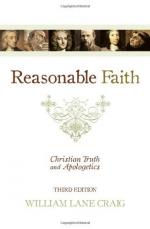|
This section contains 2,364 words (approx. 8 pages at 300 words per page) |

|
"Patristic philosophy" is the term used to refer to the philosophical presuppositions, motifs, and structures in the writings of the early Christian apologists and Church Fathers. These writers were essentially theologians rather than philosophers, for their starting point lay in God and his self-revelation. Their use of philosophy can be divided into three periods: (1) the beginnings (roughly the first and second centuries CE), in which ideas derived from Platonism, Stoicism, and (to a lesser extent) Skepticism were employed chiefly for apologetic purposes, largely under the influence of Hellenistic Judaism; (2) the early Alexandrian period, during which Middle Platonism and Stoicism were dominant, especially in the thought of Clement and Origen; and (3) the development of Christian Neoplatonism, first under the influence of Porphyry and later under that of Proclus. The influence of Philo of Alexandria may have been felt during the first period and certainly was an important...
|
This section contains 2,364 words (approx. 8 pages at 300 words per page) |

|


